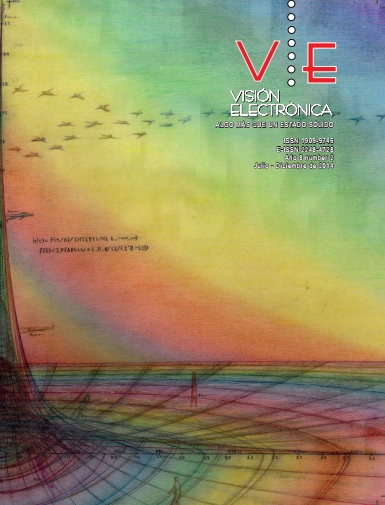DOI:
https://doi.org/10.14483/22484728.9857Publicado:
2014-12-28Número:
Vol. 8 Núm. 2 (2014)Sección:
Visión InvestigadoraSensing and pointing for cognitive radios using autonomous search devices
Radars
Palabras clave:
Sensing for cognitive radios, Pointing autonomous devices, Radiation patterns (es).Descargas
Resumen (es)
This work is motivated by the monitoring function used in cognitive radio networks. To this end, two autonomous devices for searching electromagnetic signals were designed and implemented. One of them is fixed, while the other one performs the signal search to optimize the antenna pointing. The device that performs the search transmits a signal which must be returned by the other device at each position to evaluate the power. Once the search is completed, it is decided which position has the highest received signal power
Resumen (en)
RadarsReferencias
J. Mitola III and J. G.Q Maguire (1999 ). “ Cognitive Radio: Making Software Radios More Personal.” IEEE Personal Communications (Wireless Communications) 6(4): 13-18.
Akyildiz, I. F., W. Y. Lee, et al. (April 2008 ). “A survey on spectrum management in cognitive radio networks.” IEEE Communications Magazine 46(4): 40-48.
Akyildiz, I. F., Won-Yeol Lee, et al. (2009). “ CRAHNs: Cognitive radio ad hoc networks ” Ad Hoc Networks, ScienceDirect Elsevier 7: 810-836.
Cordeiro, C., K. Challapali, et al. (2005). IEEE 802.22: the first worldwide wireless standard based on cognitive radios. New Frontiers in Dynamic Spectrum Access Networks, 2005. DySPAN 2005. 2005 First IEEE International Symposium on.
E. Rodriguez-Colina, C. Ramirez-Perez, et al. (2011). Multiple Attribute Dynamic Spectrum Decision Making for Cognitive Radio Networks. Eighth International Conference on IEEE International Conference on Wireless and Optical Communications Networks,
WOCN, Print ISBN: 978-1-4577-0262-4 France: 1-5.
Filin, S., H. Harada, et al. (2011). “ International standardization of cognitive radio systems.” Communications Magazine, IEEE 49(3): 82-89.
A. M. Wyglinski, M. Nekovee and Y. T. Hou, “ Cognitive Radio Communications and Networks” , Principles & Practice, Elsevier, 2010.
XBee-PRO, OEM RF Modules, Product Manual v1.06, 2005, consulta en linea, http://ftp1.digi.com/support/documentation/900010 20 C.pdf, 2013
Gyula Simon, P´eter V¨olgyesi, Mikl´os Mar´oti, ´Akos L´edeczi, “ Simulation-based optimization of communication protocols for large-scale wireless sensor networks,” IEEE Aerospace Conference, Big Sky, MT, March 8-15, 2003.
Huogen Yu, Wanbin Tang and Shaoqian Li, “ Optimization of cooperative spectrum sensing with sensing user selection in cognitive radio networks,” EURASIP Journal on Wireless Communications and Networking 2011 2011:208.
Zhi Quan, Shuguang Cui, and Ali H. Sayed, “ Optimal Linear Cooperation for Spectrum Sensing in Cognitive Radio Networks,” IEEE JOurnal of selected topics in signal processing, Vol. 2, No. 1, February 2008.
D. Cabric, S. M. Mishra, and R. Brodersen , “ Implementation issues in spectrum sensing for cognitive radios,” Proc. 38th Asilomar Conf. Signals, Systems and Computers, Pacific Grove, CA, Nov. 2004, pp. 772–776.
S. Haykin, “ Cognitive radio: Brain-empowered wireless communications,” IEEE J. Select. Areas Commun, vol. 23, pp. 201–220, Feb. 2005.
O. Chipara, G. Hackmann, C. Lu, W.D. Smart, and G.C. Roman, “ Practical Modeling and Prediction of Radio Coverage of Indoor Sensor Networks,” In ACM/IEEE IPSN, Stockholm, Sweden, 2010.
J. Andersen, T. Rappaport, and S. Yoshida, “ Propagation measurements and models for wireless communications channels,” IEEE Communications Magazine, 1995.
H. Hashemi , “ The indoor radio propagation channel,”
proc. IEEE, vol. 81, no. 7 , pp. 943-968, July 1993.
M. F. Iskander and Z. Yun, “ Propagation prediction models for wireless communication systems,” IEEE Transactions on Microwave Theory and Techniques, The 50th Anniversary Special Issue, vol. 50, no. 3, pp. 662-673, March 2002


.png)




.jpg)





